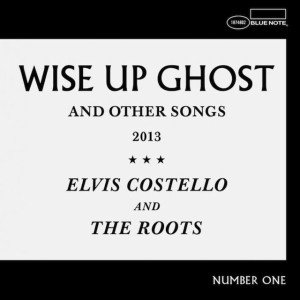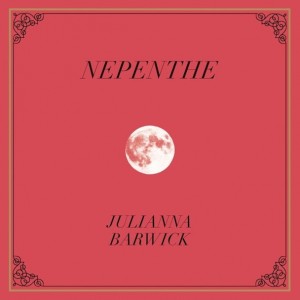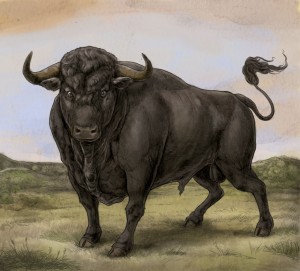Nine Inch Nails
Hesitation Marks
Angsty industrial-rock veteran Nine Inch Nails has returned from a four-year hiatus with Hesitation Marks, its eighth studio album. As always, frontman Trent Reznor delivers dark slashes of emotion as heady and self-destructive as a shot of heroin. Themes of inadequacy, longing, and self-disgust run deep, but Hesitation Marks has forsaken the crunch and growl of Nine Inch Nails’ old industrial work for a sleeker electronic sound that explores elements of techno and trip-hop. On the plus side, these new tracks are undeniably melodic. Dissonant notes and glitchy distortion are softened with sweet, catchy guitar hooks on tracks like “Came Back Haunted,” and the delicious chord progression of “All Time Low” disintegrates into sweeping layers of sound that shimmer like oil rainbows. Unfortunately, the production quality is patchy. The computer-generated fingersnaps of “Disappointed” and the awkward fade-out at the end of “Copy of a” sound disappointingly amateurish, as though produced in someone’s basement. These matte techno beats can’t hold a candle to the lush, gritty orchestration of Nine Inch Nails’ old hits. Enjoy this album for what it is, but don’t expect it to compare to their glory days – it can’t. Reznor sums it up: “Wave goodbye, wish me well. / I’ve become something else.”
Elvis Costello & The Roots
Wise Up Ghost
Whether it’s Aerosmith and Run DMC breaking down the walls between rock and rap with “Walk This Way” or David Bowie and Mick Jagger boogying their way through “Dancing in the Streets,” history has shown us that unfair odds face the duo who dares to challenge cross-genre collaborations. Despite these odds, British new wave singer Elvis Costello and iconic US hip-hop act The Roots boldly joined forces for the release of Wise Up Ghost. No stranger to collaborations, Costello has released music with the legends like Allen Toussaint, Tony Bennett, and Paul McCartney, and knows how to embrace the talents of others. Thankfully, Costello hasn’t gone hip-hop; he sticks to what he knows best – hard-lipped and bitter lyrics. The two acts know how to listen, embracing the stylistic discord between them as the dense and jagged instrumentation of The Roots’ taut grooves sound absolutely dreamy paired with Costello’s raspy voice. Costello’s elaborate melodies and high-flying lyrics remain grounded in The Roots’ backbeats, and outside of a few low points on the record, particularly “Stick Out Your Tongue” and “Wake Me Up,” Costello sounds relaxed with his late-night backing band.
Julianna Barwick
Nepenthe
The Magic Place is still an album full of new sections to discover, Julianna Barwick’s uncommon combination of worship song upbringing and multiplied, delayed technique making an album of vocal range not one of simply talent but freespun imagination, to the point where the idea of Barwick’s songs having been written seems absurd next to them still unspooling in unpredictable ways. On Nepenthe, Barwick records in-studio and with the assistance of admiring group Sigur Rós, which adds in some ways to Barwick’s evolution but also makes for an easier, more familiar listen. There’s nothing like the curious use of guitar on “Bob in Your Gait” or the drowned Beach Boys vocals of “Prizewinning.” Instead there’s the band’s identifiable piano, tuned to the same depth, and an album-wide wave approach to Barwick’s vocals, repetition that doesn’t leave much room for spontaneity, building as it must. That’s not to say Nepenthe isn’t any good – though it takes until “Pyrrhic” to really get started, moments like the modified recitation of “All Creatures Great and Small” chorals on “Labyrinthine” or the single, enigmatic line on “Crystal Lake,” briefly suggesting the grief in which the album was conceived, are still unmistakably Barwick’s own.
San Fermin
San Fermin
I first picked up this this album because the accompanying photo featured a man wearing horn-rimmed glasses, so it was surprising to me the real star of the album is the chorus of female voices that take over approximately a third of the songs. This is especially true in “Crueler Kind” where tight female harmonies pair with a brass backing, bringing to mind an era of jazz clubs and big-band musical numbers. On other tracks (for example, the first song, “Renaissance!”), the attempted soulful bass lyrics by Ellis Ludwig-Leone, who runs the one-man project, continually fall flat. Now that I mention it, the opening song is a little bit of a let-down altogether – the spare vocals alternating with firm piano chords is more cheesy than effective, with contrived crescendos.
Soundwise, San Fermin falls in the same gentle-hipster-brass-and-strings category as Of Monsters and Men and any number of other semi-popular indie bands of the last five years – unsurprisingly, considering the prominent horn-rimmed glasses. On one hand, it’s an album I have no problem listening to several times as I work or read. On the other hand, it belongs to a saturated genre; since none of the songs of the album are really striking, there are much better options. San Fermin might have the requisite hipster references to biblical allegories and literary figures, but unfortunately lacks a real spark.





